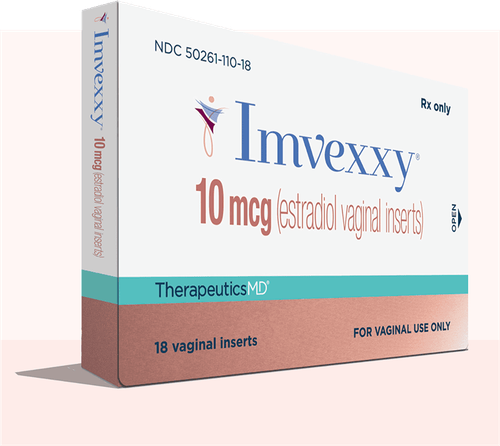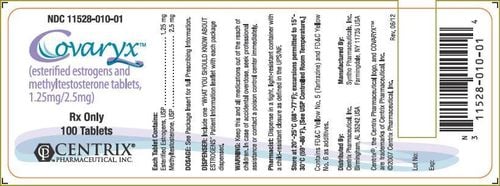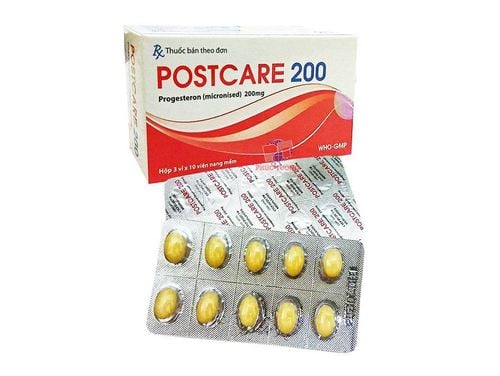This is an automatically translated article.
Progesteron is a sex hormone that plays an important role in maintaining a woman's menstrual cycle and pregnancy, produced mainly in the ovaries. Triclofem is a synthetic product that contains an ingredient that is structurally similar to this hormone. The main active ingredient in Triclofem is used in the treatment of a number of conditions and is also used for a number of other purposes.1. What are the effects of Triclofem?
What does Triclofem do? Triclofem is the brand name of Medroxyprogesteron acetate (17 alpha-acetoxyprogesteron), a synthetic progestogen that is structurally similar to natural progesterone but more potent. The drug is in the form of a suspension for injection, each vial of 1 ml, box of 20 vials, the content of Medroxyprogesterone acetate in each ml of Triclofem is 150mg.
Medroxyprogesteron acetate in Triclofem has a contraceptive effect thanks to its ability to inhibit the ripening of the follicle and the release of an egg from the ovary. In addition, the drug also inhibits the proliferation of the endometrium, changes the viscosity of cervical secretions, and interferes with the penetration of sperm into the uterine cavity. The continuous use of low doses of progesterone in combination with estrogen for the relief of menopausal symptoms can largely eliminate vaginal bleeding and the adverse effects of progesterone on blood lipids (e.g. increase in LDL, lowering of HDL). ).
Effects on estrogen-dependent cancer cells, related to the ability to inhibit the synthesis of estrogen receptors, making these cells insensitive to estrogen, thereby stopping growth. When used in high doses, the drug also has a direct effect on cancer cells.
2. In what case is Triclofem indicated?
Thanks to the above effects, Medroxyprogesteron acetate is often used in the following cases:
Contraceptive Treatment adjuvant or terminal treatment of some hormone-dependent malignancies (such as endometrial cancer), inoperable breast cancer, metastatic uterine kidney cancer when surgery and radiation therapy alone or in combination with surgery have failed). Symptomatic treatment of endometriosis (a condition in which the cells of the endometrium do not stay in the uterus and cause symptoms such as: pelvic pain, heavy menstrual bleeding, dysmenorrhoea , abnormal bleeding,...) Used in postmenopausal hormone replacement therapy to prevent endometrial hyperplasia caused by estrogen. In addition, some other cases require long-term effects of progestogen such as polymenorrhea, abnormal uterine bleeding due to hormone imbalance, secondary amenorrhea. However, with the injectable form and active ingredient content as in Triclofem, the drug is used as a primary method of contraception.
Long-term contraception. Short-term contraception in cases (male partners after vasectomy need time for the vas deferens to take effect, women receiving Rubella vaccine, women awaiting sterilization.
3. Dosage and how to use Triclofem
Triclofem is injected during the first 5 days of a normal menstrual cycle or the first 5 days postpartum (deferred to 6 weeks if breastfeeding), at a dose of 1 vial/time. Inject the next dose within 12 to 13 weeks. The pill can prevent ovulation and prevent pregnancy for 12 weeks (+/- 5 days), but can delay ovulation for up to a year. To ensure continued contraception, the initial dosing schedule may change when switching from another method of contraception. Menstruation may stop completely in about a year while using Triclofem and return when you stop using it.
4. Contraindications to Triclofem
Triclofem is contraindicated in the following people:
Patients who are allergic to any component of this injection Have or have ever had thrombophlebitis, thromboembolism or heart failure, stroke. Liver disease Vaginal bleeding of unknown cause Incomplete fetal failure Porphyria metabolism disorder. Presence or suspicion of malignancy of the genital organs or breast. Pregnant women Note: Do not use Triclofem to test for pregnancy. The drug is used for adults, for children 12 to 18 years old should only be used when other methods cannot be used anymore. Long-term injections of Triclofem can cause loss of bone mineral density (BMD). Therefore, ask your doctor about vitamin D, calcium supplements, or necessary tests to monitor health.
Use this injection with caution in people with a history of diabetes, depression, or illnesses aggravated by fluid retention.
5. Triclofem side effects
Common undesirable effects when using Triclofem are as follows
Weight gain. Lower HDL and increase LDL. Depression, decreased sexual function. Male breast enlargement. Nausea, abdominal pain, loss of appetite. Amenorrhea, infertility (lasting up to 18 months after stopping the drug), menstrual irregularities, and irregular bleeding between periods (common in the first 3 months). Some serious side effects can occur with the use of the drug. Accordingly, when experiencing any of the following signs, the patient should immediately notify the doctor:
Mental and mood changes (severe depression or new depression); Swollen ankles or feet, bone pain; Abnormal vaginal bleeding (such as continuous bleeding, sudden heavy bleeding); Persistent nausea and vomiting; severe stomach, stomach or pelvic pain; Weakness, unusual tiredness; Dark urine, yellow eyes, jaundice, convulsions. The above does not include a list of all drug side effects. If you have any questions about unusual symptoms that occur during use of the drug or need more information on how to use the drug, please contact a qualified doctor for assistance.
Follow Vinmec International General Hospital website to get more health, nutrition and beauty information to protect the health of yourself and your loved ones in your family.
Please dial HOTLINE for more information or register for an appointment HERE. Download MyVinmec app to make appointments faster and to manage your bookings easily.













